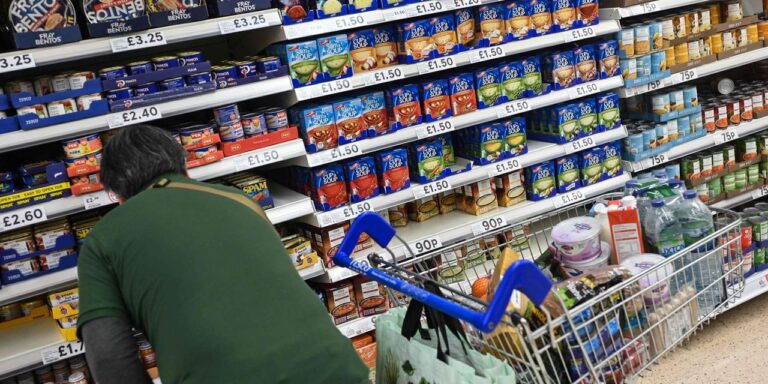U.K. government bond yields dived on Tuesday, helping lift interest-rate sensitive portions of the London stock market, after a report showed Britain’s retail inflation fell to its slowest pace in more than a year.
The British Retail Consortium said that lower costs for domestically-grown food saw annual shop price inflation slip to 5.2% in October from 6.2% in September, the fifth monthly decline in a row and the lowest rate since August 2022.
Meanwhile, U.K. government statistics released Tuesday showed the number of companies going broke in England and Wales in 2023 is on course to be the highest since the financial crisis in 2009.
Evidence of easing price pressures and struggling companies were seen cementing expectations that the Bank of England will leave interest rates unchanged at 5.25% after its monetary policy meeting on Thursday.
“Groceries are still getting more expensive, but more slowly, which is taking the edge off the panic shoppers have been feeling at the tills,” said Susannah Streeter, head of money and markets at Hargreaves Lansdown.
“This is also more palatable for Bank of England policymakers…Expectations are rising that the pause button on interest rates will be hit again,” Streeter added.
This narrative boosted demand for U.K. government bonds, with the 10-year gilt yield
BX:TMBMKGB-10Y
dropping 7.7 basis points to 4.484%, around the lowest in two weeks.
Shares in London-listed stocks that tend to be particularly sensitive to borrowing costs consequently were were upbeat. Housebuilder Persimmon
PSN,
rose more than 2%, real estate group British Land
BLND,
added 2% and clothing retailer Next
NXT,
advanced 1.5%.
In contrast, shares of BP
BP,
lost 4% after the energy giant missed earnings expectations. Softness in such resources groups restricted the FTSE 100
UK:UKX
to a 0.5% gain, while the DAX
DX:DAX
in Frankfurt added 0.6% and the CAC 40
FR:PX1
in Paris rose 1%.


